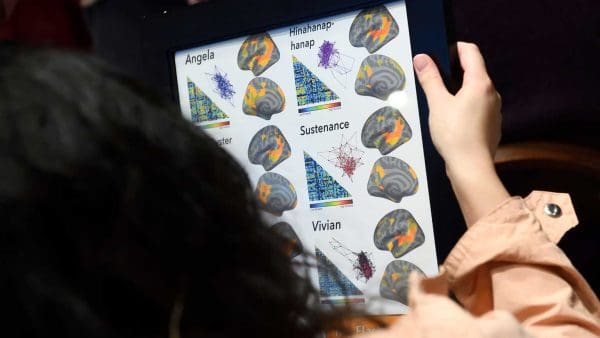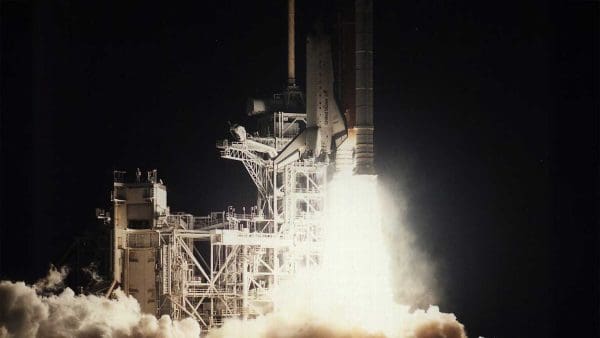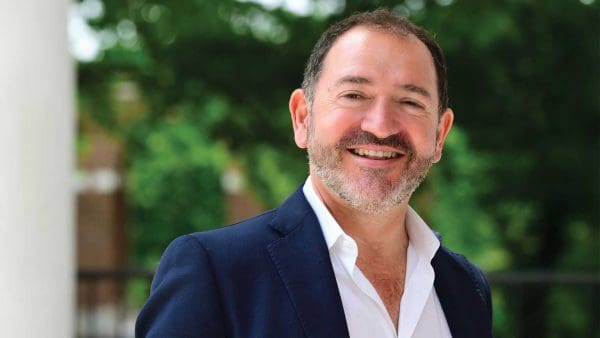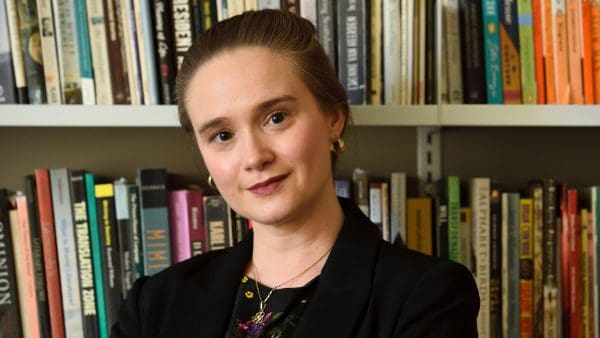The new dean of the Krieger School of Arts and Sciences stands in a mud-smeared patch of lawn holding a wet tennis ball in her gloved hand. Whether the damp is from wet grass or dog drool is debatable, as the dean’s two dogs, Sookie and Lily, have been bounding across the freshman quad in pursuit of their toy. This is business as usual for Dean Beverly Wendland and her husband, Michael McCaffery, who directs the university’s Integrated Imaging Center, especially on Saturday mornings when they break from lab and office work to walk the canines that accompany them to campus every day. They’re often stopped with requests to pet the dogs. Today, a young boy in sweatpants approaches. “Do you want to say hello?” she asks the boy. “Do you want to give them a treat?”
Watching Wendland interact with Sookie and Lily, it’s clear how important her dogs are to her. But it’s the way she connects with the human community around her—be it faculty, students, staff, or someone with a desire to pet a dog—that makes an even bigger impression.
“I care deeply about people,” Wendland says. “And I want to make sure that everybody I work with feels valued and appreciated for their contributions. I also care deeply about making a difference. That’s one of the reasons I was attracted to the challenge of taking on this very important job. I want to leave the world a better place.”
That “very important job” is the James B. Knapp deanship of the Krieger School of Arts and Sciences, to which Wendland was appointed on February 12, 2015, after having served as interim dean since July 2014. President Ronald J. Daniels announced the appointment and said, “Beverly Wendland is the leader that the Krieger School of Arts and Sciences needs and deserves at this moment. Her deep passion and high aspirations for the school, her commitment to the institutional goals we all share, and her warm and collegial spirit will serve the Krieger School and our entire university enormously well in the years to come.”
Wendland joined the Hopkins faculty in 1998 as a member of the Department of Biology. She also holds a joint appointment in the Department of Biophysics. A recipient of funding from the National Institutes of Health and the National Science Foundation, Wendland and her team study fundamental cellular processes using yeast cells as a simple model system.
Until being named permanent dean, Wendland was also principal investigator for a National Institute of General Medical Sciences training grant, which receives $1 million in annual funding for the Krieger School’s Cell, Molecular, Developmental Biology, and Biophysics graduate program—a program she previously co-directed.
“When I came to the biology department in 1998, there was a real opportunity for me to contribute and to grow as a result,” she reflects. “I was ready to embrace the challenge, and it’s been amazing.”
As chair of the biology department beginning in 2009, Wendland led its faculty through a comprehensive strategic planning process and significant turnover of faculty. She also facilitated important curricular changes, including working with the chemistry department to reimagine the organic chemistry/biochemistry course sequence for undergraduates. Wendland was an early champion of the Gateway Sciences Initiative, encouraging and supporting faculty who lead or participate in introductory science courses. She also helped plan the state-of-the-art Undergraduate Teaching Laboratories at Homewood, a building that is redefining the undergraduate research experience at Johns Hopkins.
Inspired by an earthquake
Wendland, 51, was born in Palo Alto’s Stanford Hospital, the only child of parents who divorced two years later. A self-described bookworm, she was usually the smartest kid in the class, and she recalls summers where she would read a book a day.
Although Wendland was close to both parents, she spent her early years with her mother, moving roughly every three years (including a yearlong stint on a 32-foot sailboat without plumbing in Santa Barbara harbor). Wendland credits her peripatetic childhood for making her “a resilient, adaptable sort of person.”
“I think I’m a trooper,” she says. “I don’t feel entitled to anything special. I just figure out how to make things work with what I have.”
It was the 1971 San Fernando earthquake, however, that set in motion Wendland’s interest in science. While her mother reacted to the earthquake by moving across the country to live near family in Pascagoula, Mississippi, Wendland, by contrast, became fascinated by the phenomenon. “My main reaction [to the earthquake] was to learn more about them,” she says. “I actually started out in college at San Diego State as a geophysics major. I’d really gotten interested in things like plate tectonics just from those early experiences.”
It was “a really amazing class in zoology” followed by a course in neurobiology that opened Wendland’s eyes to what she calls “the creative possibilities of science.” “The idea that you could look at a biological system and ask how or why does that work, and come up with these elegant experiments that demonstrate that this idea or question you had held some water was very appealing to me,” Wendland recalls.
A first-generation college graduate, she earned a BS in bioengineering from the University of California, San Diego, in 1986; received a PhD in neurosciences from Stanford in 1994; and completed a postdoctoral fellowship in cellular and molecular medicine at UCSD in 1998. Her mother, who returned to college as an adult and who passed away 20 years ago—just one year into Wendland’s postdoctoral studies—graduated from college a year after her daughter, she recalls proudly.
Outside the lab and classroom, Wendland enjoys crafts and cooking, and hosts her nearly 90-year-old father for dinner every Sunday since he moved to Baltimore two years ago.
She is also a collector of West Coast wine, an Orioles fan, and an avid walker who keeps track of her steps with a FitBit.
A vision for the future
As dean, Wendland has begun to strategize and formulate a vision for the School of Arts and Sciences, which starts with four goals that are interlinked and touch all corners of the Krieger community. The first includes enhancing and building on the school’s outstanding humanities programs. One step in this effort is the recently launched medicine, science, and humanities major. “The humanities equip our students with the skills of critical thinking, critical analysis, an ability to communicate clearly, and resiliency in terms of being able to grapple with tough problems and find answers to them,” says Wendland. “And I think those are the kinds of skills that are going to allow our students to thrive and excel, to become the leaders of the future.” On top of that, she adds, “the humanities just make you a better human, one who is better able to appreciate the world we live in and all of the diverse points of view in it.”
Wendland is also committed to diversity within the Krieger School and is in the process of reigniting the school’s Diversity Committee. “Increasing diversity among both faculty and the student body requires devoted, steady, conscious, unrelenting attention at a very local level as well as at higher levels,” Wendland explains. “This is crucial because it’s important that our university is an accurate reflection of the world’s diverse people and points of view.”
In addition, Wendland wants to build on the university’s mission of preparing students to be future leaders in the world through encouraging interdisciplinary research, innovation, and collaboration. Finally, the new dean hopes to strengthen engagement with the school’s volunteer leaders and alumni.
It is an ambitious agenda, but one that Wendland embraces with relish. “I believe in collaboration, innovative thinking, accountability, and, of course, hard work,” she says. “And Hopkins is a place where people with creative minds with a passion for learning have the opportunity to work together and do amazing things.”




